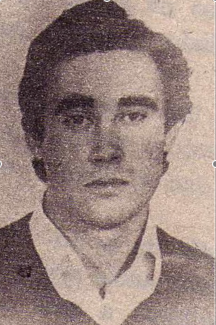Murder of Miquel Grau
| Murder of Miquel Grau | |
|---|---|
 Miquel Grau Gómez | |
| Location | Alicante, Spain |
| Date | 6 October 1977 |
Attack type | murder |
| Weapon | brick |
| Deaths | 1 |
| Victim | Miquel Grau Gómez |
| Perpetrator | Miguel Ángel Panadero |
| Verdict | guilty; sentence 12 years |
The murder of Miquel Grau Gómez occurred on 6 October 1977 in the city of
Murder
On 9 October 1977, the National Day of the Valencian Country was to be celebrated legally for the first time. In the run-up to 9 October, various political parties coordinated the putting up of posters in Alicante.[1]
On the night of 6 October 1977, four members of a group organized by the Communist Movement of the Valencian Country were in the Plaza de Los Luceros putting up posters which called for the pre-Diada (the day before 9 October). They were Llum Quiñonero (24), Miquel Grau (22), Juan Ángel Torrerosa (19) and Javier Álvarez (14). A New Force militant, Miguel Ángel Panadero Sandoval, threw a brick from his balcony which hit Grau on the head and left him in a coma. With the help of a passing driver, he was taken to the Hospital 20 de Noviembre, where he was admitted; ten days later, on 16 October, Grau died of his injuries.[1][2]
Funeral and burial
Grau's funeral, organized by eighteen political parties and trade union centres, was celebrated at the San Martin church of Valencia. According to El País, 7,000 to 10,000 people attended the funeral, occupying the church and the surrounding streets. A militant of the Communist Movement of the Valencian Country read a text in eulogy:[3]
Miquel was killed because he opposed fascism, because he wanted freedom for our people, because he wanted autonomy for the Valencian Country. This is not an isolated fascist attack. Militants of democratic parties have been attacked in Valencia and Alicante. They planted bombs in bookshops and theatres. The threat to democrats has not stopped.
— Fragment of text read at the funeral of Miquel Grau.[3]
Grau was buried in the Nuestra Señora del Remedio cemetery in Alicante. 18,000 people joined the procession in order to accompany his coffin to the cemetery; however, acting under orders from the Civil Governor, anti-riot squads of the Armed Police blocked the procession and took the coffin from them in order to move it quickly to the cemetery by car. The police attacked and dispersed the crowds who tried to reach the cemetery.[4][3]
Trial, sentence and pardon
Miguel Ángel Panadero turned himself in to the police in October 1977.
In May 1979, the Minister of Justice of the Suárez government, Íñigo Cavero, gave a partial pardon to Miguel Ángel Panadero, changing the twelve year sentence of ordinary prison[citation needed] for six years of special imprisonment ("reclusión mayor"[citation needed]). Thanks to this partial pardon, Panadero was released in 1982.[1][8]
Memorial
In 2015, the city of Alicante installed a commemorative plaque in the Plaza de Los Luceros, in the exact location of the murder. Grau received a posthumous Gold Medal of the City and a street with his name was approved. This commemoration was an initiative by the Compromís per Alacant party, supported by every other represented party.[9][10]
In popular culture
- The band Al Tall released the Catalan song A Miquel assasinaren (Miquel assassinated) in 1978, in memoriam of Miquel Grau.
References
- ^ a b c Bolland, Enrique (8 October 2015). "Honor a un mártir de la libertad". El País (in Spanish). Alicante. Archived from the original on 14 October 2017. Retrieved 13 October 2017.
- ^ ISSN 2340-7379.
- ^ a b c Millas, Jaime (20 October 1977). "Funeral y manifestación por el joven muerto en Alicante". Alicante. El País. Archived from the original on 14 October 2017. Retrieved 13 October 2017.
- ^ ISSN 1130-8060.
- ISBN 978-1782250449. Retrieved 2 July 2019.
- ^ Raneda, Mari Carmen (2 June 1978). "Juicio contra el presunto homicida de un joven valenciano" (in Spanish). Alicante. El País. Archived from the original on 14 October 2017. Retrieved 14 October 2017.
- ^ "Doce años de prisión al homicida de un militante de izquierda" (in Spanish). El País. 3 January 1979. Archived from the original on 14 October 2017. Retrieved 14 October 2017.
- ^ "El condenado por la muerte de Miquel Grau es procurador en Valencia" (in Spanish). Las Provincias. 7 March 2013. Archived from the original on 14 October 2017. Retrieved 14 October 2017.
- eldiario.es. Archivedfrom the original on 14 October 2017. Retrieved 14 October 2017.
- ^ "Alicante concede la Medalla de Oro a Miquel Grau, 38 años después de su asesinato" (in Spanish). La Vanguardia. 31 July 2015. Archived from the original on 14 October 2017. Retrieved 14 October 2017.
